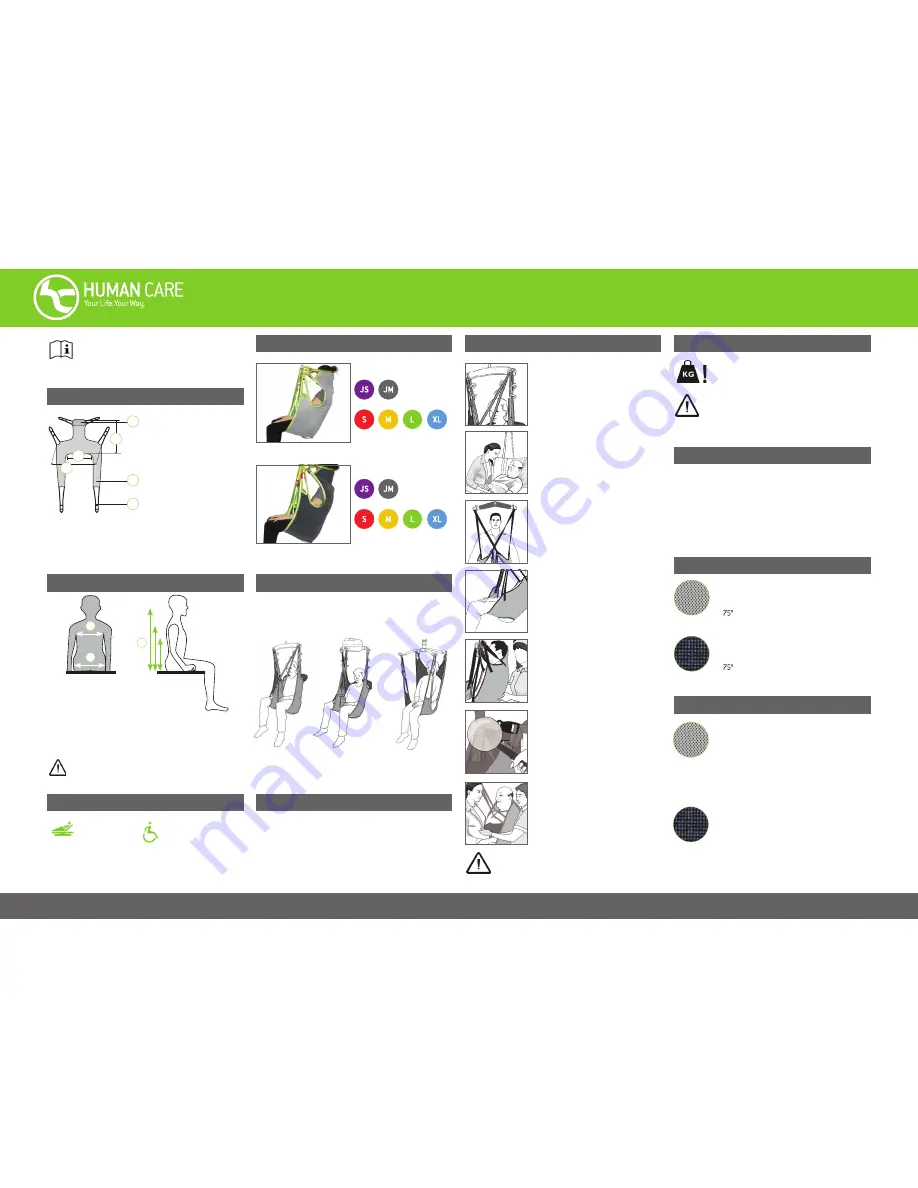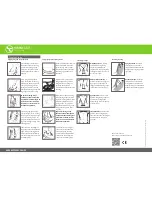
QUICK REFERENCE GUIDE
999
50-Q
ui
ck R
ef
ere
nc
e G
ui
de
-Silh
ou
et
te Slin
gs
-R
ev 0
3 (06 2
01
8)
Silhouette Sling
Important!
This quick reference guide does
not replace the user manual which can be
downloaded at www.humancaregroup.com.
Read all instructions before use!
Understand Your Sling
Important!
This sling has been designed and tested
for indoor use with one patient at a time and must
only be used for transferring a person. This product
is not a swing.
Choose the Right Sling
1
2
3
5
6
1. Sling height
2. Aperture
3. Sling width
4. Leg straps
5. Head support
6. Three position straps
To and/or from
a bed
This sling is suitable for
To and/or from a
chair
Available Sizes
Model #25015
Model #25020
Sling Features
Model #25015
• Suitable for patients with
poor trunk stability
• Narrow design is ideal for
smaller older ladies
• Can be used for bathing
Model #25020
• Breathable material ideal
for pain sensitive users
• No reinforcements or
padding
• Allow transfer of moisture
and heat from patient
Maximum weight capacity
551lb/250kg
Suspension Options
2-Point
Suspension
3-Point
Suspension
4-Point
Suspension
Safe Lifting Techniques
Check that the same colour straps are
used to achieve level loading and that
the loops are securely fastened in the
carry bar hook.
Explain, if necessary, to the patient
about the lift. Check during the lift that
the patient is comfortable. Look for
non-verbal signs of discomfort.
Ensure their weight is evenly
distributed between the straps. Make
sure the sling does not pinch or pull the
patient’s skin at any point.
Make sure the patient will not slide
out of the sling or tip backwards or
forwards. The sling should comfortably
surround the patient being lifted.
While lowering a patient, using a gentle
hand pressure to guide the patient as
the lift is moving towards the seating
surface. Ensure patient is in correct
position for seating before lowering.
Check the sling for signs of wear or
damage before using. If any signs of
damage are present, do not use the
sling.
General Care
Polyester Net - 25015
Inspection
Six Month Inspection -
The sling stitching must be checked to
ensure that the seams are intact. The fabric must be checked
to ensure it holds its shape and is rigid. The label must be
clear and legible.
Daily Inspection
- Always inspect the sling for visible signs of
damage and/or wear before use.
Plan the moving and lifting process
to ensure it is as safe as possible.
If necessary, have two caregivers
perform the transfer.
Fabric Features
Polyester Net - 25015
Flexible and airy
A soft, thin material that breathes and dries
quickly. This fabric has some elasticity and
can be left behind the patient in a chair or bed
for a short period of time. Polyester Net is
ideal for bathing and showering.
Usage
bHVC
Never leave a patient unattended in the sling!
4
Trevira - 25020
Soft and comfortable
Exclusive to Human Care, this flame retardant
material provides optimal comfort. It is a
breathable material that can be left behind the
patient as it does not promote skin breakdown.
Ideal for patients with pain.
Trevira - 25020
bHVC
SLING TOO LARGE
Patient may slip out.
SLING TOO SMALL
Patient may slip out. Condition may
worsen.
1
3
Throcanter to throcanter size: Measure side to back
to side (at the bottom, not the belly).
Measure back width.
Measure back height for
low back, shoulder and high back sling.
Always measure in the seated position.
Refer to the user manual for the nearest comparible size.
2




